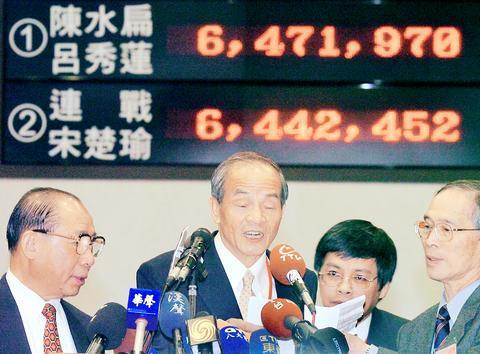The Central Election Commission (CEC) announced last night that Chen Shui-bian (
According to official election results provided the CEC, the total number of valid ballots cast yesterday was 12,914,422. The Chen-Lu ticket won 6,471,970 votes, or 50.11 percent of total eligible votes, while the Lien-Soong ticket won 6,442,452 votes, or 49.89 percent of the total.

PHOTO: TANG PIN-CHAO. TAIPEI TIMES
Of the 16,504,179 eligible voters, 13,251,719 cast votes, a turnout of 80.288 percent. The number of invalid ballots was 337,297, or 2.5 percent of the total ballots cast.
"The Chen-Lu ticket has won the 11th Presidential, Vice-Presidential Election," CEC Chairman George Huang (
Chen's margin of victory, 30,598 votes, was much less than in the 2000 presidential election.
In that year Chen won 4,977,697 votes (39.30 percent) to Soong's 4,664,972 (36.84 percent) and Lien's 2,925,513 (23.10 percent).
The results indicate that the pan-blue camp's assumption that Lien and Soong together would win the same number of votes as they won as rivals four years ago was misplaced.
In this year's election, the northern region -- Taipei City, Taipei County, Keelung City, Ilan County, Taoyuan County, Hsinchu City and Hsinchu County -- the Lien-Soong ticket won 54.77 percent to Chen-Lu's 45.23 percent of valid votes.
In Taipei City, the Lien-Soong ticket won 56.53 percent to Chen and Lu's 43.47 percent.
"In the past four years, President Chen has been focusing on the development of all regions except Taipei, while during the Chinese Nationalist Party (KMT) rule, Taipei had been the focus of their administration. Therefore, it is not surprising that in this election, the pan-blue camp had a landslide victory in the Taipei regions," said Ku Chung-hwa (
In the Taipei City mayoral election in 2002, KMT candidate Ma Ying-jeou (
The DPP also seemed to make some progress in the Hakka majority areas of Hsinchu county and city, Taoyuan County and Miaoli County.
It has tried to court Hakka voters over the past four years by establishing a Hakka-language television station and reviving Hakka culture and language.
In the 2000 election, the DPP ticket won no more than 37 percent in any of these regions. The Chen-Lu ticket this time won nearly 45 percent in Taoyuan County and Hsinchu County.
The southern region again proved to be the stronghold of the pan-green camp. In Chiayi county and city, Tainan city and county and Kaohsiung City, the Chen-Lu ticket won more than 55 percent of the vote.
"Given the DPP's southern Taiwan grassroots strategy, it is no surprise that the southern region has been the DPP's stronghold," Ku said.
Nantou County, formerly home of the Taiwan Provincial Government and a stronghold of former governor Soong, also became more green.
In the previous presidential election, Soong, running as an independent, won 46.94 percent of total vote to Chen's 34.49 percent. This time, the pan-green camp won 48.75 percent of votes in the county to the pan-blue camp's 51.25 percent, despite criticism from the pan-blue camp of the DPP government's efforts to rebuild the county following the 921 earthquake in 1999.
"In the next four years, the DPP administration should put its emphasis on the reconciliation of different ethnic groups," Ku said.

Alain Robert, known as the "French Spider-Man," praised Alex Honnold as exceptionally well-prepared after the US climber completed a free solo ascent of Taipei 101 yesterday. Robert said Honnold's ascent of the 508m-tall skyscraper in just more than one-and-a-half hours without using safety ropes or equipment was a remarkable achievement. "This is my life," he said in an interview conducted in French, adding that he liked the feeling of being "on the edge of danger." The 63-year-old Frenchman climbed Taipei 101 using ropes in December 2004, taking about four hours to reach the top. On a one-to-10 scale of difficulty, Robert said Taipei 101

Nipah virus infection is to be officially listed as a category 5 notifiable infectious disease in Taiwan in March, while clinical treatment guidelines are being formulated, the Centers for Disease Control (CDC) said yesterday. With Nipah infections being reported in other countries and considering its relatively high fatality rate, the centers on Jan. 16 announced that it would be listed as a notifiable infectious disease to bolster the nation’s systematic early warning system and increase public awareness, the CDC said. Bangladesh reported four fatal cases last year in separate districts, with three linked to raw date palm sap consumption, CDC Epidemic Intelligence

US climber Alex Honnold left Taiwan this morning a day after completing a free-solo ascent of Taipei 101, a feat that drew cheers from onlookers and gained widespread international attention. Honnold yesterday scaled the 101-story skyscraper without a rope or safety harness. The climb — the highest urban free-solo ascent ever attempted — took just more than 90 minutes and was streamed live on Netflix. It was covered by major international news outlets including CNN, the New York Times, the Guardian and the Wall Street Journal. As Honnold prepared to leave Taiwan today, he attracted a crowd when he and his wife, Sanni,

Taiwanese and US defense groups are collaborating to introduce deployable, semi-autonomous manufacturing systems for drones and components in a boost to the nation’s supply chain resilience. Taiwan’s G-Tech Optroelectronics Corp subsidiary GTOC and the US’ Aerkomm Inc on Friday announced an agreement with fellow US-based Firestorm Lab to adopt the latter’s xCell, a technology featuring 3D printers fitted in 6.1m container units. The systems enable aerial platforms and parts to be produced in high volumes from dispersed nodes capable of rapid redeployment, to minimize the risk of enemy strikes and to meet field requirements, they said. Firestorm chief technology officer Ian Muceus said